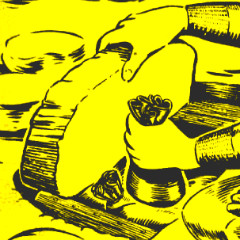Our assumptions about God affect our experience of him. My mind returned to this thought several times while recently reflecting on the parable of the talents.
The story, which Jesus tells in Matthew 25, is familiar to most of us. Before a man of means departs on a lengthy journey, he deposits some of his wealth into the hands of his three servants: five talents to the first, two to the second, and one to the third.
As soon as he’s gone, the men get busy.
Different servants, different results
The first man heads to the market and starts trading. The second man, too. But after wringing his hands for a while, the third walks out back, digs a hole, and drops his dollars inside, covering them up and slinking back indoors.
By the time the master returns, the industrious servants have both doubled their holdings. The master is naturally pleased to see this and says as much. But when he asks the third servant about his deposit, the story takes a turn.
“Master, I knew you to be a hard man,” the servant says, sheepishly. “I was afraid, and I went and hid your talent in the ground.” Having dug up the money beforehand, he now passes it to his master. “Here you have what is yours.”
You get what you believe
In his telling, Jesus offers little detail about these men, except that the master dolled out the talents according to their individual abilities, and so the money was split up unevenly between the three. That said, there is another important difference, another unevenness, evident but unspoken:
The first two servants thought well of their master while the third did not.
The third servant begins his apology for burying the money by saying that he knows his master to be hard. His estimation determines his actions. But is the master hard? From the account of the first two servants, he sounds like a good man, one who rewards those who serve him. And yet the master is hard toward the shirker. He first excoriates him, calling him wicked and lazy, and then throws him out.
Given the master’s reception of the first two servants, it’s clear that this result is self-inflicted. The third servant brings his judgement upon himself. Fear of the master keeps him from serving the master. Thinking the worst keeps him from doing his best. And he catches hell for it.
It’s a classic picture of the self-fulfilled prophecy. He thinks God is harsh and consequently acts in such a way as to earn harsh treatment. His negative start determines his negative end. The first two servants, however, start with a different estimation of their master and end with a much different experience.
God loves us — seriously
I think our relationships with God are much the same. It might be easy to take the witness of scripture and the subjective data of our lives and assume that God has it out for us, that God is hard. But easy and true are not always the same.
Scripture tells us over and again that God is good. John tells us that he is love. James tells us that he gives us every good and perfect gift. Such gifts must include provision for our salvation, which John also says flows from the heart of divine love. For God so loved the world.
The truth is that God’s basic and essential disposition toward us is one of love and mercy. That’s who God is. This conviction is so strong in the Orthodox tradition that we regularly refer to him as the lover of mankind.
The prodigal’s dad
We can see a picture of this love in another parable, that of the prodigal. While the rebellious son insults his father, takes his inheritance, and blows it on riotous living, his father waits for his return.
A change of fortune (and heart) brings the son home, and the father runs out to meet him. He’s been looking for him, hoping to see him, eager to welcome him back. The father doesn’t loathe his son. He doesn’t hate him. He is not anxious to punish him, itching to make him pay back his squandered inheritance. Instead, the happy father feasts his child. His disposition is one of love and mercy, one of graciousness.
That is the heart of God toward us. If we think otherwise, we live in a state darkened by our our cynicism, our own fear, our own hatred. The loving God does not create that reality for us. Rather, we imprison ourselves within our own prejudices and false assumptions.
I wonder how many areas in our experience with God are affected by false or uncharitable views of him. As you are about your business today, let your mind wander into those places where you find yourself being hard on God, maybe resentful of him.
Are those opinions inhibiting your relationship with him? What can you do to change your view?
Go deeper
I’ve written about these themes before in several pieces. Here are three I think are particularly helpful if you want to go deeper: (1) “God made us to love us,” (2) “The changeless love of God,” and (3) “Into the hands of a loving God.”













